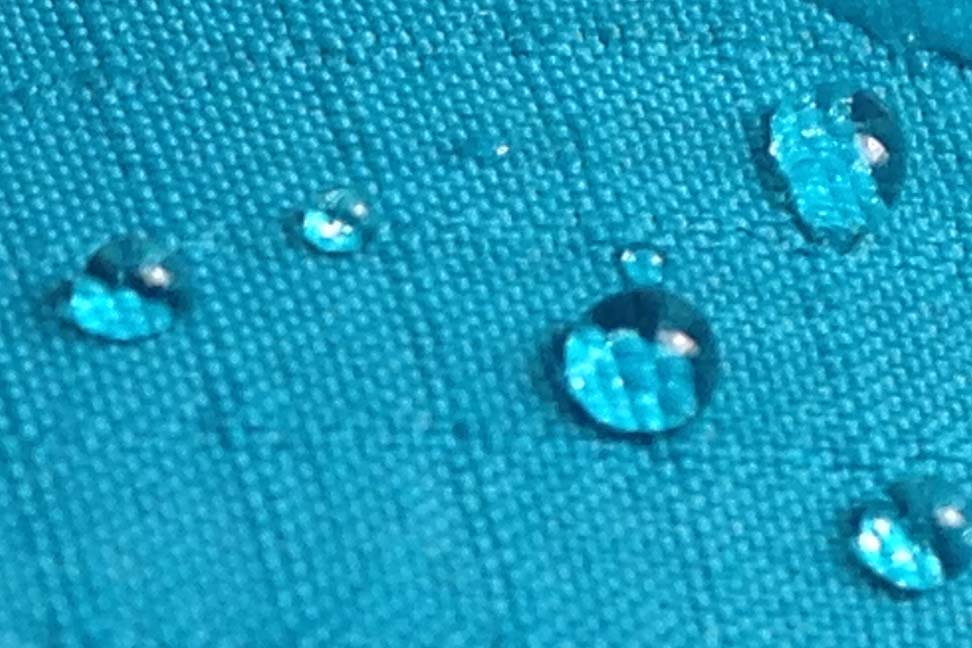New research from the University of Leeds suggests that the use fluorochemicals in the manufacture of waterproof outdoor garments may not be necessary.
The PFC problem
Fluorochemicals (per- and poly-fluorinated chemicals, or PFCs) are commonly found in durable water-repellant (DWR) coatings and waterproof membranes used in outdoor apparel. The coatings also help repel dirt and stains. However, awareness is increasing of the environmental impact of PFCs: some have the potential to become widely dispersed in water, where they could persist for decades or even hundreds of years. As well as environmental consequences, PFCs have been associated with health problems in humans and other animals.
In early 2016, a report revealed evidence that ‘toxic chemicals’ could be found in ‘most outdoor gear’. Out of 40 products tested, only four were free of PFCs. The chemicals could be found in products by many mainstream outdoor brands.
“Once released into the environment most PFCs break down very slowly. They can remain in the environment for many years after their release and are dispersed over the entire globe,” the report said.
New research
Research from Leeds’ School of Design, published in the journal Chemosphere, compared the performance of fabrics with newer, alternative finishes alongside traditional fluorocarbon-based treatments.
The 22 fabric samples were subjected to extensive chemical analysis and testing. The team also surveyed 575 outdoor enthusiasts – whose interests covered hiking, trekking, mountaineering and hillwalking – in order to ask them how they used waterproof clothing.
Philippa Hill, whose PhD research is on the subject of the paper, said, “Most studies just look at technical aspects or environmental pollution, but we wanted to see what consumers considered the most important factors in choosing outdoor clothing. We found that 82% of people considered water repellency to be the most important factor, but the majority of people were indifferent to levels of stain resistance and oil repellency.”
A range of fabric samples were tested. The study concluded that water repellency was similar across the range of all finished fabrics, but non-fluorinated finishes provided no oil repellency.
Dr Richard Blackburn, head of the Sustainable Materials Research Group at Leeds, clarified: “We concluded that the use of fluorochemicals in outdoor apparel represents over-engineering, providing oil repellency that is in excess of user requirements. Significant environmental and toxicological benefits could be achieved by switching outdoor apparel to non-fluorinated finishes without a significant reduction in garment water-repellency performance.”

PFCs can be found in the water-repellent finishes of many garments
Sustainability is of increasing importance to the outdoor clothing industry. Dr Blackburn added that, once economies of scale came into effect, relatively new non-fluorinated fabrics were unlikely to be more expensive than their counterparts.
Further research is being undertaken into the effects of abrasion, wear and tear, and laundering on the various fabrics.
Taking action
Some manufacturers have committed to reducing their reliance on PFCs for outdoor apparel, although others have claimed it’s challenging to meet the necessary performance requirements while removing PFCs. Gore Fabrics, who manufacture Gore-Tex, have announced a roadmap to eliminate PFCs ‘of environmental concern’ from their consumer fabrics by the end of 2020.
Patagonia, a company with a long heritage of environmental responsibility, have recently switched to a different chemical coating that will break down faster in the environment, and is less toxic towards wildlife and human beings. Patagonia continue to research DWR coatings with less environmental impact.
Páramo, the UK-based outdoor clothing brand, have never added PFC-based coatings or finishes to their products. However, in 2014 they committed to being entirely PFC-free throughout their entire supply chain, to ensure none of their third-party suppliers use PFCs either. Páramo was the first brand to sign Greenpeace’s Detox Outdoor Commitment in January 2016. Many other companies have signed agreements to phase out PFCs at a later date.








